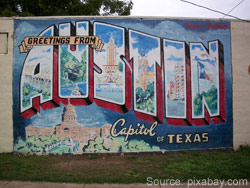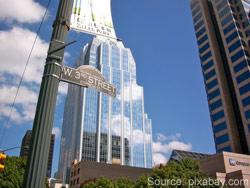
The city where Texas Chainsaw Massacre was filmed, and where the infamous South by Southwest concert is held. Centrally located in Texas along the Colorado River, just northwest of Houston lies the Live Music Capital of the World, Austin, Texas. This high-tech capital city has plenty to offer a new resident. If you are contemplating moving to Austin, but aren't sure of where to start, take a look at the following guide for tips and information to help make your transition as easy as possible. Start by getting a free quote here at Movers.com
If you are contemplating moving to Austin, but aren't sure of where to start, take a look at the following guide for tips and information to help make your transition as easy as possible. Start by getting a free quote here at Movers.com
Austin Climate
Pack your summer clothes and sunscreen if you're moving to Austin, as the area has a semi arid climate. Typically, you'll find very hot summers and mild winters with plenty of sunshine all year round. July and August have highs in the 90s, and can reach temperatures over 100.
Temperatures in the winter are generally in the high 50s to mid 60s, and are usually dry. However, the city averages approximately 86-inches of rainfall annually.
Austin Neighborhoods
Centralized in the city, the Downtown Austin area is where you'll find most of the hustle and bustle of a big city. There's a bright and shining nightlife with upscale restaurants, bars, and countless music events geared for all age groups. There has been an increase in condos being built in this area, allowing for more residents to call the heart of the city home. If you work here, you'll be able to walk here, too.
If you venture away from downtown, there are many residential neighborhoods along the Mopac Expressway like Tarrytown, Clarksville, Enfield and Rosedale. These are more upscale neighborhoods and often contain the homes of some of Austin's wealthiest residents. If you settle here, you'll enjoy breathtaking views of hills and Oak trees. For more residential and quiet areas, look into Brentwood, Crestview or Allendale, as these neighborhoods have streets lined with trees - great for raising a family.
Registering Your Car
Once you move to Texas, you will have to update your registration within 30 days. You could potentially be charged a penalty if you fail to do so within the allotted time. You will first need to have your vehicle inspected, at any certified Texas Department of Public Safety inspection station, which requires proof of Texas auto insurance. You are required to have coverage of $30,000 per injured person, up to a total of $60,000 for everyone injured in an accident, and $25,000 for property damage in the state.
To get your plates and registration, you'll need the title or previous registration as proof of ownership, your proof of insurance, and inspection papers. Non-resident college students attending school in the state and active members of the U.S. Armed Forces are not required to register their vehicles in Texas. The Texas DMV does not issue driver's licenses. You will have to transfer your license at the Department of Public Safety, no more than 90 days after you move to the state.
Austin Schools
Austin residents have the option between 29 different school districts, 17 charter schools and 69 private schools. Austin Independent School District serves a majority of the city, and boasts numerous achievements with standardized testing. In addition to these schools, there are many private schools in the area, including Regents School of Austin, Redeemer Lutheran School and Austin Peace Academy.
The University of Texas at Austin claims the city as its home, and has over 38,000 undergraduates enrolled and over 12,000 graduate students. Other colleges in the area include: Austin Community College, Concordia University, Huston-Tillotson Univeristy, Austin Graduate School of Theology and The Art Institute of Austin.
Austin Employment
This city is big, and so it its job market. The defense and industry sectors boom due to many engineering graduates from the University of Texas at Austin, where jobs in healthcare, business, education, government and entertainment also stimulate the economy. Some of Austin's largest employers are: Austin Independent School District, the City of Austin, Dell, IBM, the State of Texas and University of Austin at Texas. In 2012, Forbes ranked Austin number one among all big cities for jobs, while the Wall Street Journal ranked the area number one for growing businesses.
As a result, the unemployment rate in the city is 5 percent, much lower than the national average. If you want to test your luck in a big-city job market, Austin is the place to do it.
Living Costs in the City
Despite the current state of the economy, the housing market still thrives in Austin, though it's more expensive to live here than in other rural parts of Texas. The median home value in the area is approximately $280,000, but can go up to the multi-millions for larger scale homes and vast properties. However, just north of Austin, there are more moderate homes for a price tag of about $200,000.
If you're renting, a one-bedroom apartment can start at approximately $550 per month, and go upwards beyond $1,000. A 3,000 square-foot home can have an electric bill ranging from $60-$70 in the winter and $200-$300 in the summer with conservative use.
Austin Moving Resources
Moving and storage companies are ready and willing to help you with your move to Austin, whether you're moving from out of state or from another county in Texas. Make sure you get estimates from multiple moving services before you commit to hiring any (at least three estimates). Check back to our guides for tips on how to choose your moving service wisely with important questions to ask, differentiating between types of estimates, and mistakes to avoid. Visit the following pages at Movers.com to get quotes for the following services:
Austin Transportation
If you're looking for public transportation in the city, you'll find it mainly by bus, which is provided by Capital Metropolitan Transportation Authority (Capital Metro). The Capital MetroRail is a 32-mile commuter rail system, with many upgrades and additions in store for the near future. Greyhound Lines operate a station at East Koenig Lane by Highland Mall.
Major freeways for personal car use are: Interstate 35 to the east and the Mopac Expressway (Loop 1) to the west. U.S. Highway 183, 290 and State Highway 71 are also major arteries in this commuter-heavy city.
Don't forget about walking or cycling, as the weather is generally warm and dry to allow for an on-foot commute (or by bicycle) within short to moderate distances.
Culture & Contemporary Life
 You might be moving for business, for school or for pleasure, but whichever reasons lead you to Austin, the city will keep you entertained. Besides being the Mecca for live music with its South by Southwest concert, Austin offers plenty of outdoor leisure activities as well.
You might be moving for business, for school or for pleasure, but whichever reasons lead you to Austin, the city will keep you entertained. Besides being the Mecca for live music with its South by Southwest concert, Austin offers plenty of outdoor leisure activities as well.
If you want a healthy nightlife, much of the action that goes on in Downtown Austin happens on Sixth Street, a nine-block strip lined with bars, restaurants, clubs and galleries. A party happens on every corner, every weekend, and draws party goers from all over - especially during Halloween.
Barton Springs, the nation's largest natural swimming pool, and Deep Eddy are popular for swimmers. In addition, the city also has Hippie Hollow Park, which offers a clothing-optional public park that is officially sanctioned. There's also the Capitol 10,000 10K, the Austin Marathon and the Capital of Texas Triathlon.
If you're looking for diverse cuisine, you'll find it in Austin as well. The city is bursting with flavorful restaurants and bars that range from small bistros to Japanese steak houses to classic southern restaurants.
Austin Relocation Tips
-
Austin is a big city with a lot of residents as well as tourists who travel all year round - be prepared for longer commutes.
-
A lot of young people and single people live in the city, so if you're looking for your perfect match, you might find it here - locals say it is one of the best cities for dating.
-
Make sure you research your neighborhood before committing to a move, since the area has both urban areas and countryside areas to choose from.